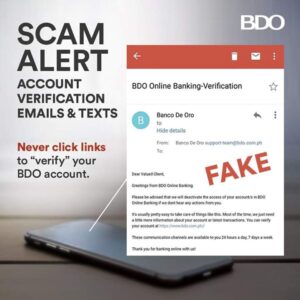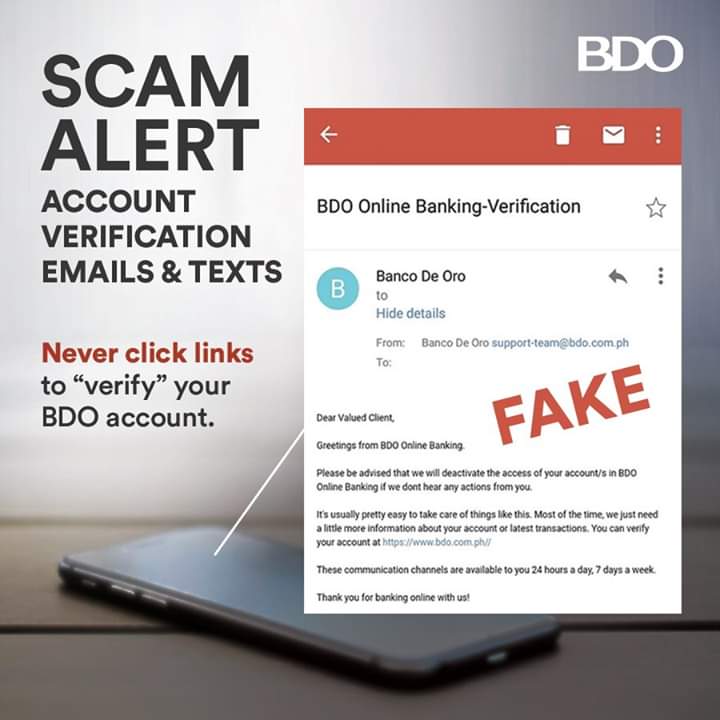
Scammers are stepping into high gear with their attacks as the country continues to observe the enhanced community quarantine. A prevalent scam has them posing as a bank personnel and urging clients to verify their bank accounts by clicking on a link. This link then opens a website that looks exactly like a bank’s official website. On this fake website, they trick clients into divulging their personal information.
Personal information includes account numbers, credit card information, online banking login details like usernames and passwords, and One-Time PINs (OTP). It enables scammers to use clients’ identities, access their online bank accounts, and steal their money.
BDO Unibank reiterates that it will never ask their clients to verify their bank accounts. Legitimate bank officers, it says, will never reach out via SMS, call, email, or social media to ask for personal information for account validation.
Banking from home
The Bangko Sentral ng Pilipinas (BSP), alongside the various banks, have been encouraging clients to bank online over visiting their branches particularly at this time when the entire country is moving to flatten the COVID-19 curve.
Online banking, the BSP adds, promotes social distancing and helps accountholders avoid face-to-face interactions. Above all, staying at home allows them to protect themselves and their loved ones from the virus.
BDO, for its part, continues to encourage its clients to bank from home and enroll to BDO Online Banking. To guide clients who may be banking online for the first time, the bank promotes how-to videos on its YouTube page and has helpful posts on its Facebook page and official website.
Staying vigilant against scammers
Scammers however are taking advantage of the lockdown situation and the added online banking usage. Upping their ante, their attacks now are more sophisticated than ever—their grammar is correct; their communication style is convincingly professional; their fake websites look exactly like their legitimate counterparts. As a result, many, especially first-time users of online banking, are getting victimized and losing their money.
The Bankers Association of the Philippines (BAP) already called on accountholders to be more vigilant: “There have been emails going around informing clients of account deactivation and asking clients to click on a link to prevent deactivation due to COVID-19. We would like to advise against doing so since it will compromise your account security… Banks will never request for your sensitive information.”
Meanwhile, through its #BDOAntiScam campaign, BDO empowers its clients with information that teaches them how to be smarter than scammers. It exposes scam attacks, reminds about the things legitimate bank officers will never do or ask for, and shares defenses such as never sharing personal information and never clicking on links to verify their bank accounts.
Clients who have been scammed, or even just suspect of being scammed, can get in touch with BDO by emailing [email protected]. They can also log in Messenger, look for BDO Customer Care with the blue verified checkmark from Facebook, and chat with a bank representative.




